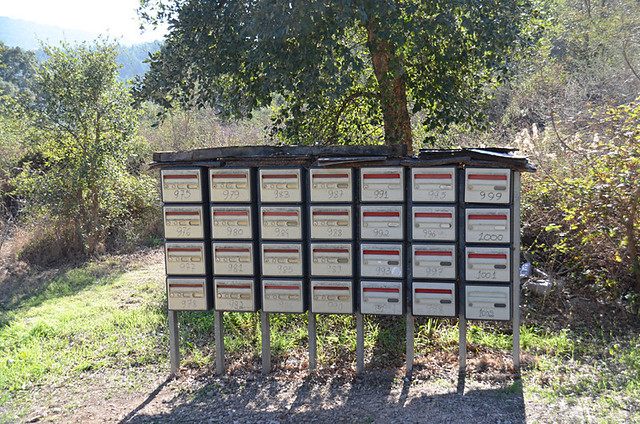A white van pulls up alongside us as we’re checking our letter box. It is literally a box for letters, one of many in a postal tenement block where the tarmac ends and the dirt track which leads to our house, and many others, begins. These banks of postal boxes are common in Portugal.
The man in the van asks a question in Portuguese. Bingo, he’s after directions. I’m okay at directions in a couple of languages. It seems to be one of the first things taught when it comes to learning languages. Before we moved to Spain we took Spanish lessons at the Cervantes Institute in Manchester. The first lesson involved directions, and it stuck. It’s amazing the number of times I’ve had to say “sigue todo recto” (continue straight ahead). Maybe I just used it a lot because I knew it.

We spend 30mins a day on Duolingo, learning Brazilian Portuguese (Duolingo doesn’t have Portuguese Portuguese). It’s not perfect, but it helps. We can hold basic conversations, up to a point, with Dona Catarina, our landlady. But she’s extremely patient and speaks very clearly. The problem is when anyone else other than Dona Catarina speaks to us in Portuguese.
The Portuguese, like the Spanish, are complimentary when you make an effort, telling us we can speak it well after we rattle of a few stock phrases when we know we’re appalling. Many can speak English and are happy to do so, especially after we’ve tried speaking Portuguese. Thankfully they are not like the Richard Head in the Norwich tower block who posted “We do not tolerate people speaking other languages than English in the flats.”
Imagine if people in other countries took that stance? I can just see how “we do not tolerate people speaking other languages than Spanish” would go down in the parts of Spain popular with immigrant Brits? We briefly worked with a woman who questioned what the ‘de la’ of Santa Cruz de la Palma meant, and she’d lived on Tenerife for 30 years. Once in a supermarket in Los Gigantes I had to explain to the English shop assistant what a bocadillo was.

We’re at the ‘learning key phrases’ stage; thinking beforehand how we say something in particular circumstances. It works well… until people reply. The funny thing is ‘prepping in the head’ before any conversation becomes automatic. When we’re in Britain I can find myself thinking ‘how am I going to say this?’ whilst waiting to be served in a shop, or queueing for train tickets etc. before another voice in my head says “it’s English ya dunderheid, you don’t have to think how to say it.”
We’re at the post box because we’re waiting for a haggis we ordered online to turn up. It’s the morning of Burns Night and our last chance of having a chieftain o the puddin’ race to celebrate. It was ordered three weeks previously and is due to be delivered by ordinary post. Couriers are a no-no. We have only had problems with courier services since we’ve been in Portugal; they are shocking.

They don’t appear aware many citizens have post boxes such as ours, it always comes as a surprise when we explain what it is. They can’t deliver to them because a signature is required, so they ask about neighbours. Trying to explain our neighbours have a post box for the same reason as we do seems to also come as a shock.
In theory there are ways around it. Some have pick up points. But the last time we tried, we found a delivery notice in our post box telling us our parcel was at the nearest pick up point. It wasn’t.
There are other courier services which advise to get in touch to make alternative arrangements and then don’t answer emails, website contact forms, or telephone calls. On Tenerife we could ‘talk delivery drivers in’ over the last few hundred meters. Here they won’t phone.

So we stick to Post Office deliveries. If something is too big for the box the postman leaves it at the local mini-market.
The missing haggis is the first time they’ve let us down.
The man in the van asks for help with directions. He shows me a sheet with the address he’s looking for. It’s the street we’re on, but I immediately recognise the address as being a post box. In fact it’s one we’re standing in front of.
I point this out to the delivery driver. How did he not know it was a post box? I ask what he’s delivering, just in case he has a wee haggis hidden in his van. It’s a heating system. He ain’t going to deliver that to a post box.
We leave him to it, another delivery not delivered by courier service, and wander off haggis-less.

The haggis turns up a week later, the part of the delivery notice with our name on it half eaten. I take it into the mini-market and hand it over. The woman knows us by now and doesn’t even read it. Instead she laughs and says “caracois” (snails) as she reaches for a haggis-sized box.
It’s simple, old fashioned, postal deliveries on a local level and, apart from this occasion, far more efficient than any courier service. At least we did get the haggis in the end.




Be the first to comment